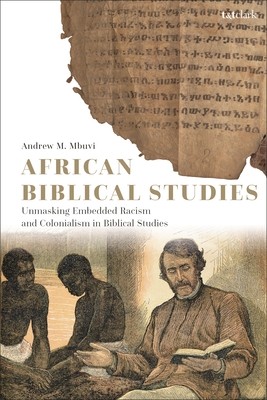
- We will send in 10–14 business days.
- Author: Andrew M Mbuvi
- Publisher: Bloomsbury Publishing PLC
- ISBN-10: 0567707717
- ISBN-13: 9780567707710
- Format: 15.6 x 23.4 x 1.4 cm, kieti viršeliai
- Language: English
- SAVE -10% with code: EXTRA
Reviews
Description
Andrew M. Mbuvi makes the case for African biblical studies as a vibrant and important emerging distinct discipline, while also using its postcolonial optic to critique biblical studies for its continued underlying racially and imperialistically motivated tendencies. Mbuvi argues that the emergence of biblical studies as a discipline in the West coincides with, and benefits from, the establishment of the colonial project that included African colonization. At the heart of the colonial project was the Bible, not only as ferried by missionaries, who often espoused racialized views, to convert "heathens in the distant lands," but as the text used in the racialized justification of the colonial violence. Interpretive approaches established within these racist and colonialist matrices continue to dominate the discipline, perpetuating racialized interpretive methodology and frameworks.
On these grounds, Mbuvi makes the case that the continued marginalization of non-western approaches is a reflection of the continuing colonialist structure and presuppositions in the discipline of biblical studies. African Biblical Studies not only exposes and critiques these persistent oppressive and subjugating tendencies but showcases how African postcolonial methodologies and studies, that prioritize readings from the perspective of the marginalized and oppressed, offer an alternative framework for the discipline. These readings, while destabilizing and undermining the predominantly white Euro-American approaches and their ingrained prejudices, and problematizing the biblical text itself, posit the need for biblical interpretation that is anti-colonial and anti-racist.
EXTRA 10 % discount with code: EXTRA
The promotion ends in 21d.15:49:07
The discount code is valid when purchasing from 10 €. Discounts do not stack.
- Author: Andrew M Mbuvi
- Publisher: Bloomsbury Publishing PLC
- ISBN-10: 0567707717
- ISBN-13: 9780567707710
- Format: 15.6 x 23.4 x 1.4 cm, kieti viršeliai
- Language: English English
Andrew M. Mbuvi makes the case for African biblical studies as a vibrant and important emerging distinct discipline, while also using its postcolonial optic to critique biblical studies for its continued underlying racially and imperialistically motivated tendencies. Mbuvi argues that the emergence of biblical studies as a discipline in the West coincides with, and benefits from, the establishment of the colonial project that included African colonization. At the heart of the colonial project was the Bible, not only as ferried by missionaries, who often espoused racialized views, to convert "heathens in the distant lands," but as the text used in the racialized justification of the colonial violence. Interpretive approaches established within these racist and colonialist matrices continue to dominate the discipline, perpetuating racialized interpretive methodology and frameworks.
On these grounds, Mbuvi makes the case that the continued marginalization of non-western approaches is a reflection of the continuing colonialist structure and presuppositions in the discipline of biblical studies. African Biblical Studies not only exposes and critiques these persistent oppressive and subjugating tendencies but showcases how African postcolonial methodologies and studies, that prioritize readings from the perspective of the marginalized and oppressed, offer an alternative framework for the discipline. These readings, while destabilizing and undermining the predominantly white Euro-American approaches and their ingrained prejudices, and problematizing the biblical text itself, posit the need for biblical interpretation that is anti-colonial and anti-racist.


Reviews